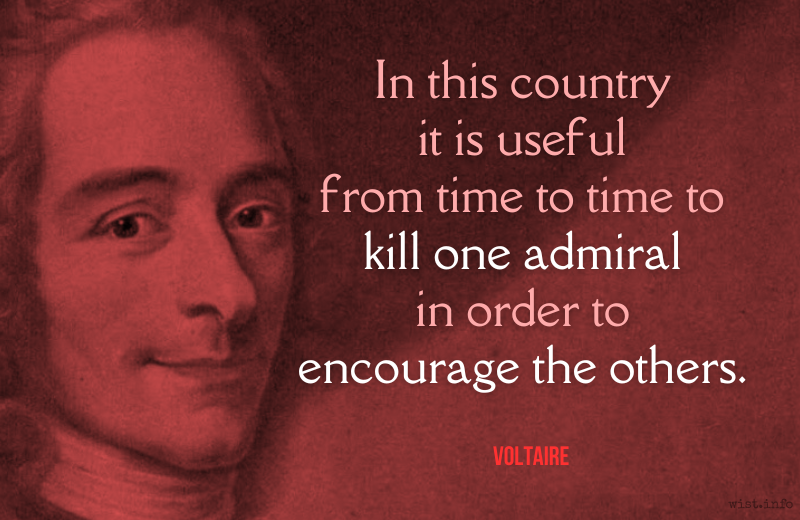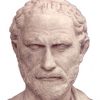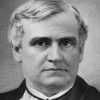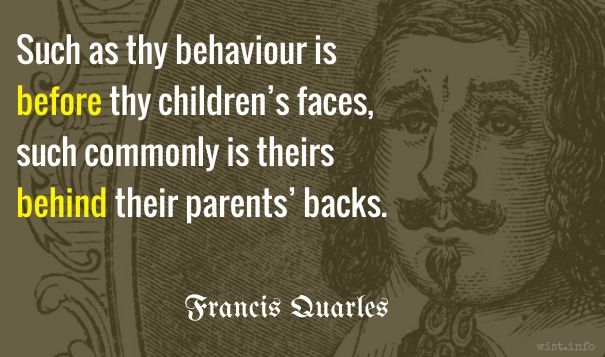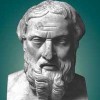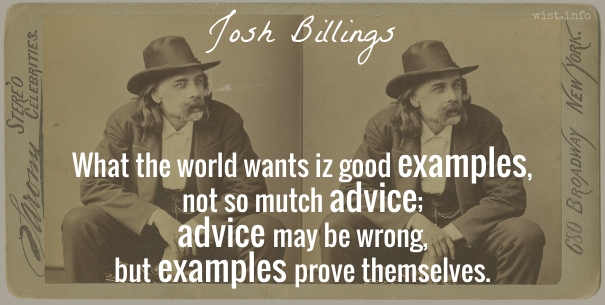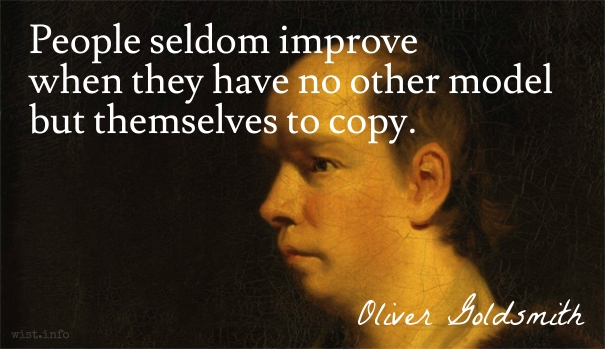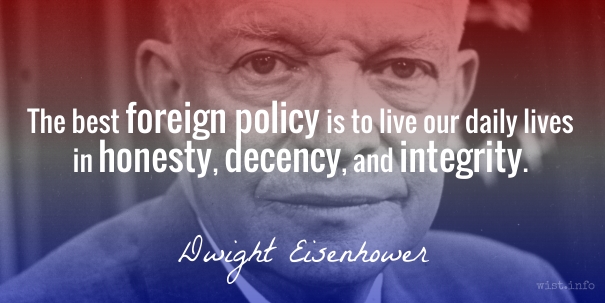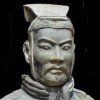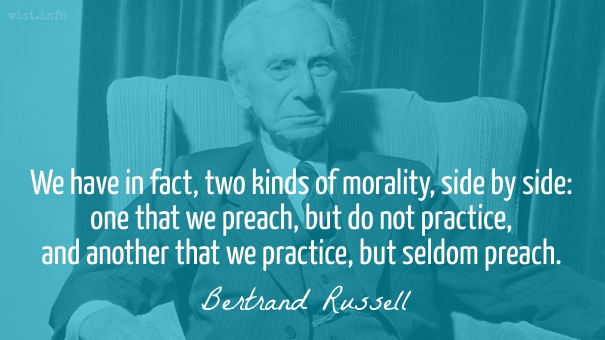It is not the whole ov our duty tew foller the examples ov good men, but tew leave behind us sum decent tracks for others tew foller.
[It is not the whole of our duty to follow the examples of good men, but to leave behind us some decent tracks for others to follow.]
Josh Billings (1818-1885) American humorist, aphorist [pseud. of Henry Wheeler Shaw]
Everybody’s Friend, Or; Josh Billing’s Encyclopedia and Proverbial Philosophy of Wit and Humor, ch. 132 “Affurisms: Chips” (1874)
(Source)
Quotations about:
example
Note not all quotations have been tagged, so Search may find additional quotes on this topic.
But why speak of others? Let me now return to myself.
[Sed quid ego alios? Ad me ipsum iam revertar.]
Marcus Tullius Cicero (106-43 BC) Roman orator, statesman, philosopher
De Senectute [Cato Maior; On Old Age], ch. 13 / sec. 45 (13.45) (44 BC) [tr. Falconer (1923)]
(Source)
(Source (Latin)). Alternate translations:
But it is not nede also to remembre in what thynges the othir olde men tokyn their honeste delectacyons. Therfor I shall come ayen to speke of myself.
[tr. Worcester/Worcester/Scrope (1481)]
But wherefore speak I so much of others? I will now returne to my selfe.
[tr. Austin (1648)]
But what have I to do with others, let me return now to myself.
[tr. J. D. (1744)]
But why should I quote others, and not rather return and speak of myself?
[tr. Logan (1744)]
But to pass from the practice of others to my own ....
[tr. Melmoth (1773)]
But why do I mention others? I will now return to myself.
[Cornish Bros. ed. (1847)]
But why do I refer to others? let me now return to myself.
[tr. Edmonds (1874)]
But why am I talking about others? I now return to my own case.
[tr. Peabody (1884)]
But why mention others? I will come back to my own case.
[tr. Shuckburgh (1895)]
Why speak of these?
Let's take myself.
[tr. Allison (1916)]
But enough of others -- let me return to myself!
[tr. Grant (1960, 1971 ed.)]
But why speak of other men? Let me revert to my own case.
[tr. Copley (1967)]
Enough of other people. Let me speak now of my own experience.
[tr. Cobbold (2012)]
But again I don't have to talk about the world famous. I can provide personal examples.
[tr. Gerberding (2014)]
I’ll now revert only to myself,
And put all the others on the shelf.
[tr. Bozzi (2015)]
In this country it is useful from time to time to kill one admiral in order to encourage the others.
[Dans ce pays-ci il est bon de tuer de tems en tems un Amiral pour encourager les autres.]
Voltaire (1694-1778) French writer [pseud. of Francois-Marie Arouet]
Candide, ch. 23 (1759) [tr. Adams (1966)]
(Source)
As Candide witnesses the (real-life) 1757 execution of English Admiral John Byng, who withdrew his undermanned ships from a naval battle during the French invasion of Minorca at the beginning of the Seven Years War. Byng was scapegoated for poor condition of the Mediterranean fleet, and court martialed for "failing to do his utmost" in the battle, which carried an automatic death penalty. In real life, Voltaire had been one of the people who attempted to intervene on Byng's behalf. In the book, Candide is so appalled by the injustice, he refuses to touch ground on English soil.
The last few words ("pour encourager les autres") are frequently quoted on their own referring to any harsh punishment used as an example to incent those who follow.
(Source (French)). Alternate translations:
In this country it is found requisite, now and then, to put an admiral to death, in order to encourage the others to fight.
[tr. Smollett (1759)]
In this country it is found good, from time to time, to kill one Admiral to encourage the others.
[Source (1859)]
In this country it is found requisite, now and then, to put one admiral to death, in order to spirit up the others.
[tr. Smollett/Thornton (1920)]
In this country it is good to kill an Admiral from time to time to encourage the others.
[Modern Library ed. (1920)]
In this country it is necessary, now and then, to put one admiral to death in order to inspire the others to fight.
[tr. Morley (1922)]
In this country it is a good thing to kill an admiral from time to time to encourage the others.
[Random House ed. (1928)]
In this country it’s good to kill an admiral now and then, to encourage the others.
[tr. Bair (1959)]
In this country it is found requisite,now and then to kill an admiral, in order to encourage the others.
[tr. Cameron (1997)]
In this country they think it's good to kill an Admiral from time to time, to encourage the others.
[tr. Gordon (1999)]
Be at peace yourself. Then you will be able to bring peace to others.
[Pone te primus in pace, et tunc alios poteris pacificare.]
Thomas à Kempis (c. 1380-1471) German-Dutch priest, author
The Imitation of Christ [De Imitatione Christi], Book 2, ch. 3, v. 1 (2.3.1) (c. 1418-27) [tr. Rooney (1979)]
(Source)
(Source (Latin)). Alternate translations:
First put thyself in peace, and then mayest thou the better pacify others.
[tr. Whitford/Raynal (1530/1871)]
First put yourself at peace, and then you may the better make others be at peace.
[tr. Whitford/Gardiner (1530/1955)]
Be first of all at peace with thy selfe, then maist thou be better able to pacifie others.
[tr. Page (1639)]
Secure Peace at Home in the first place; and, when thy own Breast is thus composed, it will then be proper to Reconcile and make Peace among thy Neighbors.
[tr. Stanhope (1696; 1706 ed.)]
Thou must first secure the peace of thy own breast; before thou wilt be qualified to restore peace to others.
[tr. Payne (1803)]
First, keep thyself in peace, and then shalt thou be able to pacify others.
[ed. Parker (1841)]
Thou must first secure the peace of thy own breast ere thou be qualified to restore peace to others.
[tr. Dibdin (1851)]
First keep thyself in peace, and then thou wilt be able to bring others to peace.
[ed. Bagster (1860)]
First keep thyself in peace, and then shalt thou be able to be a peacemaker towards others.
[tr. Benham (1874)]
First keep thyself in peace, and then thou shalt be able to keep peace among others.
[tr. Anon. (1901)]
First keep peace with yourself; then you will be able to bring peace to others.
[tr. Croft/Bolton (1940)]
Keep yourself at peace first, and then you will be able to make others peaceful.
[tr. Daplyn (1952)]
Firstly, be peaceful yourself, and you will be able to bring peace to others.
[tr. Sherley-Price (1952)]
Peace in your own soul first of all, then you can think about making peace between other people.
[tr. Knox-Oakley (1959)]
Live in peace yourself and then you can bring peace to others.
[tr. Knott (1962)]
Keep yourself at peace first, and then you will be able to bring peace to others.
[tr. Creasy (1989)]
The United States is not a beacon, not a light of freedom! She is a warning, rather than an example to the world!
Lydia Maria Child (1802-1880) American abolitionist, activist, journalist, suffragist
Speech, Massachusetts Anti-Slavery Society 25th Anniversary Conference (1857)
(Source)
On slavery in the US, two months before the Dredd Scott decision.
Almost always elided as "The United States ... is a warning, rather than example to the world."
Virtue is not left to stand alone. He who practises it will have neighbors.
[德不孤、必有鄰。]
Confucius (c. 551- c. 479 BC) Chinese philosopher, sage, politician [孔夫子 (Kǒng Fūzǐ, K'ung Fu-tzu, K'ung Fu Tse), 孔子 (Kǒngzǐ, Chungni), 孔丘 (Kǒng Qiū, K'ung Ch'iu)]
The Analects [論語, 论语, Lúnyǔ], Book 4, verse 25 (4.25) (6th C. BC – AD 3rd C.) [tr. Legge (1861)]
(Source)
Differing commentary on the text can be found; it may mean that virtue attracts others to its side, or it may be a comment on virtue needing to be practiced in a social setting.
(Source (Chinese)). Alternate translations:
Virtue dwells not alone: she must have neighbors.
[tr. Jennings (1895)]
Moral worth is never left alone; society is sure to grow round him.
[tr. Ku Hung-Ming (1898)]
Virtue never dwells alone; it always has neighbors.
[tr. Soothill (1910)]
Virtue attracts friends.
[tr. Soothill (1910), Alternate]
Candidness is not fatherless, it is bound to have neighbors.
[tr. Pound (1933)]
Moral force (tê) never dwells in solitude; it will always bring neighbors.
[tr. Waley (1938)]
High moral conduct does not remain alone; it is sure to attract neighbors.
[tr. Ware (1950)]
Virtue never stands alone. It is bound to have neighbors.
[tr. Lau (1979)]
Virtue is not solitary. It is bound to have neighbors.
[tr. Dawson (1993)]
Virtue is not solitary; it always has neighbors.
[tr. Leys (1997)]
The virtuous are not solitary. They surely have neighbors.
[tr. Huang (1997)]
A virtuous person is not alone, certainly has his companions.
[tr. Cai/Yu (1998)]
Excellent persons (de) do not dwell alone; they are sure to have neighbors.
[tr. Ames/Rosemont (1998)]
Virtue is not solitary; it must have neighbors.
[tr. Brooks/Brooks (1998)]
Integrity's never alone. It always has neighbors.
[tr. Hinton (1998)]
Virtue is never solitary; it always has neighbors.
[tr. Slingerland (2003)]
Virtue is not alone. It invariably has neighbors.
[tr. Watson (2007)]
Virtue does not stand alone. It is bound to have neighbors.
[tr. Annping Chin (2014)]
A virtuous person is never lonely because there is always a comrade nearby.
[tr. Li (2020)]
Democracies have no business running secret prisons. That’s what our enemies do. If we are in a battle for the hearts and minds of people around the world, as the administration says we are, I won’t feel very secure if the people around the world believe we are no different than our enemies. […] As Americans, we do believe our system offers a better way. But the only way to convince others of that is if we live by our values. Real security begins with remembering who we are. We gain nothing by adopting the methods of our enemies.
Bob Schieffer (b. 1937) American broadcast journalist
“Free Speech,” CBS Evening News (14 Sep 2006)
(Source)
I agree with you likewise in your wishes to keep religion and government independent of each Other. Were it possible for St. Paul to rise from his grave at the present juncture, he would say to the Clergy who are now so active in settling the political Affairs of the World. “Cease from your political labors your kingdom is not of this World. Read my Epistles. In no part of them will you perceive me aiming to depose a pagan Emperor, or to place a Christian upon a throne. Christianity disdains to receive Support from human Governments. From this, it derives its preeminence over all the religions that ever have, or ever Shall exist in the World. Human Governments may receive Support from Christianity but it must be only from the love of justice, and peace which it is calculated to produce in the minds of men. By promoting these, and all the Other Christian Virtues by your precepts, and example, you will much sooner overthrow errors of all kind, and establish our pure and holy religion in the World, than by aiming to produce by your preaching, or pamphlets any change in the political state of mankind.”
Benjamin Rush (1746-1813) American physician, writer, educator, humanitarian
Letter to Thomas Jefferson (6 Oct 1800)
(Source)
“Write shorter epigrams,” is your advice.
Yet you write nothing, Velox. How concise![Scribere me quereris, Velox, epigrammata longa.
Ipse nihil scribis: tu breviora facis.]Martial (AD c.39-c.103) Spanish Roman poet, satirist, epigrammatist [Marcus Valerius Martialis]
Epigrams [Epigrammata], Book 1, epigram 110 (1.110) (AD 85-86) [tr. McLean (2014)]
(Source)
"To Velox." (Source (Latin)). Alternate translations:
Velox complains my epigrams are long,
When he writes none: he sings a shorter song.
[tr. Fletcher (c. 1650)]
You say my epigrams, Velox, too long are:
You nothing write; sure yours are shorter far.
[tr. Wright (1663)]
Of my long epigrams, you, Swift, complain;
And nothing write: I laud your shorter strain.
[tr. Elphinston (1782), Book 12, ep. 16, "To Velox, or Swift"]
You complain, Velox, that the epigrams which I write are long. You yourself write nothing; your attempts are shorter.
[tr. Bohn's Classical (1859)]
You complain, Velox, that I write long epigrams, you yourself write nothing. Yours are shorter.
[tr. Ker (1919)]
"Such lengthy epigrams," you say, "affright one."
True, yours are shorter, for you never write one.
[tr. Pott & Wright (1921)]
Velox, I make my epigrams too long, you snort?
You don't write any: That's making them too short.
[tr. Bovie (1970)]
Velox, you complain that I write long epigrams, and yourself write nothing. Do you make shorter ones?
[tr. Shackleton Bailey (1993)]
You say I write lines longer than I ought?
It's true your lines are shorter -- they are nought.
[tr. Wills (2007)]
You say my epigrams are too long.
Yours are shorter.
You write nothing.
[tr. Kennelly (2008), "Nothing"]
Swifty, you moan that I write long epigrams. You aren't writing anything yourself; is that you making shorter ones?
[tr. Nisbet (2015)]
My epigrams are word, you've complained;
But you write nothing. Yours are more restrained.
[tr. O'Connell]
“Much too long” you say, Velox, censorious,
Of my epigrams -- that’s quite uproarious.
You write none. Your brevity is glorious.
[tr. Schmidgall (2001)]
You call my epigrams verbose and lacking in concision
while you yourself write nothing. Wise decision.
[tr. Clark, "Short Enough?"]
My epigrams are wordy, you’ve complained;
But you write nothing. Yours are more restrained.
[tr. Oliver]
Hear now the treachery of the Greeks and from one learn the wickedness of all.
[Accipe nunc Danaum insidias, et crimine ab uno
Disce omnes.]Virgil (70-19 BC) Roman poet [b. Publius Vergilius Maro; also Vergil]
The Aeneid [Ænē̆is], Book 2, l. 65ff (2.65-66) [Aeneas] (29-19 BC) [tr. Fairclough (1916)]
(Source)
Regarding Sinon, who posed as a Greek refugee and persuaded the Trojans that the Trojan Horse was harmless. (Source (Latin)). Alternate translations:
Receive Greeks treacheries now; and from one crime
Learn all.
[tr. Ogilby (1649)]
Now hear how well the Greeks their wiles disguis'd;
Behold a nation in a man compris'd.
[tr. Dryden (1697)]
Now learn the treachery of the Greeks, and from one crime take a specimen of the whole nation.
[tr. Davidson/Buckley (1854), "Literally, 'from one of their tricks learn what they all are.'"]
Now listen while my tongue declares
The tale you ask of Danaan snares,
And gather from a single charge
Their catalogue of crimes at large.
[tr. Conington (1866)]
Now
Hear what the treachery of the Grecians was,
And from one crime learn all.
[tr. Cranch (1872), l. 89ff]
Know now the treachery of the Grecians, and from a single crime learn all.
[tr. Mackail (1885)]
Lo now, behold the Danaan guile, and from one wrong they wrought
Learn ye what all are like to be.
[tr. Morris (1900)]
Mark now the Danaans' cunning; from one wrong
Learn all.
[tr. Taylor (1907), st. 10, ll. 82-83]
Hear now what Greek deception is, and learn
from one dark wickedness the whole.
[tr. Williams (1910)]
Listen, and learn Greek trickiness; learn all
Their crimes from one.
[tr. Humphries (1951)]
Now hear how the Greeks tricked us; learn from one case of their wickedness
What every Greek is like.
[tr. Day Lewis (1952)]
Now listen to the treachery of the Danaans
and learn from one the wickedness of all.
[tr. Mandelbaum (1971), ll. 92-93]
Be instructed now
In Greek deceptive arts: one barefaced deed
Can tell you of them all.
[tr. Fitzgerald (1981), l.91ff]
Listen now to this story of Greek treachery, and from this one indictment, learn the ways of a whole people.
[tr. West (1990)]
Listen now to Greek treachery, and learn of all their crimes
from just this one.
[tr. Kline (2002)]
Hear now
The treachery of the Greeks, and from one offense
Learn all their evil.
[tr. Lombardo (2005)]
Now, hear the treachery of the Greeks and learn
from a single crime the nature of the beast.
[tr. Fagles (2006)]
Now hear how the Greeks baited their trap, and from one act of treachery, understand them all!
[tr. Bartsch (2021)]
In the course of my travels I remarked that all those whose opinions are decidedly repugnant to ours are not in that account barbarians and savages, but on the contrary that many of these nations make an equally good, if not better, use of their reason than we do. I took into account also the very different character which a person brought up from infancy in France or Germany exhibits, from that which, with the same mind originally, this individual would have possessed had he lived always among the Chinese or with savages, and the circumstance that in dress itself the fashion which pleased us ten years ago, and which may again, perhaps, be received into favor before ten years have gone, appears to us at this moment extravagant and ridiculous. I was thus led to infer that the ground of our opinions is far more custom and example than any certain knowledge.
[Et depuis, en voyageant, ayant reconnu que tous ceux qui ont des sentiments fort contraires aux nôtres ne sont pas pour cela barbares ni sauvages, mais que plusieurs usent autant ou plus que nous de raison; et ayant considéré combien un même homme, avec son même esprit, étant nourri dès son enfance entre des Français ou des Allemands, devient différent de ce qu’il seroit s’il avoit toujours vécu entre des Chinois ou des cannibales, et comment, jusques aux modes de nos habits, la même chose qui nous a plu il y a dix ans, et qui nous plaira peut-être encore avant dix ans, nous semble maintenant extravagante et ridicule; en sorte que c’est bien plus la coutume et l’exemple qui nous persuade, qu’aucune connaissance certaine.]
René Descartes (1596-1650) French philosopher, mathematician
Discourse on Method [Discours de la méthode], Part 2 (1637) [tr. Veitch (1901)]
(Source)
(Source (French)). Alternate translations:
And having since observ’d in my travails, That all those whose opinions are contrary to ours, are not therefore barbarous or savage, but that many use as much or more reason then we; and having consider’d how much one Man with his own understanding, bred up from his childhood among the French or the Dutch, becomes different from what he would be, had he alwayes liv’d amongst the Chineses, or the Cannibals: And how even in the fashion of our Clothes, the same thing which pleas’d ten years since, and which perhaps wil please ten years hence, seems now to us ridiculous and extravagant. So that it’s much more Custome and Example which perswades us, then any assured knowledg.
[tr. Newcombe ed. (1649)]
I further recognized in the course of my travels that all those whose sentiments are very contrary to ours are yet not necessarily barbarians or savages, but may be possessed of reason in as great or even a greater degree than ourselves. I also considered how very different the self-same man, identical in mind and spirit, may have become, according as he is brought up from childhood amongst the French or Germans, or has passed his whole life amongst Chinese or cannibals. I likewise noticed how even in the fashions of one's clothing the same thing that pleased us ten years ago, and which will perhaps please us once again before ten years are passed, seems at the present time extravagant and ridiculous. I thus concluded that it is much more custom and example that persuade us than any certain knowledge.
[tr. Haldane & Ross (1911)]
Since then I have recognized through my travels that those with views quite contrary to ours are not on that account barbarians or savages, but that many of them make use of reason as much or more than we do. I thought, too, how the same man, with the same mind, if brought up from infancy among the French or Germans, develops otherwise than he would if he had always lived among the Chinese or cannibals; and how, even in our fashions of dress, the very thing that pleased us ten years ago, and will perhaps please us again ten years hence, now strikes us as extravagant and ridiculous. Thus it is custom and example that persuade us, rather than any certain knowledge.
[tr. Cottingham, Stoothoff (1985)]
All things are tolerable which others have borne and are bearing.
[Sed significat tolerabilia esse, quae et tulerint et ferant ceteri.]
Marcus Tullius Cicero (106-43 BC) Roman orator, statesman, philosopher
Tusculan Disputations [Tusculanae Disputationes], Book 3, ch. 23 (3.23) / sec. 57 (45 BC) [tr. Yonge (1853)]
(Source)
(Source (Latin)). Alternate translations:
- "Those things are in themselves tolerable, which others have born, and do bear." [tr. Wase (1643)]
- "All things are tolerable which others have borne and can bear." [tr. Main (1824)]
- "What others have endured and endure must be tolerable." [tr. Otis (1839)]
- "Things are tolerable which others have borne and are bearing." [tr. Peabody (1886)]
- "The circumstances at hand are indeed tolerable, since others have tolerated them and continue to do so." [tr. Graver (2002)]
We will lead not merely by the example of our power but by the power of our example.
Joe Biden (b. 1942) American politician, US President (2021- ) [Joseph Robinette Biden Jr.]
Inaugural Address (20 Jan 2021)
(Source)
Regarding American foreign relations.
Each party abuses the other; the profane and the infidel believe both sides, and enjoy the fray; the reputation of religion in general suffers, and its enemies are ready to say, not what was said in the primitive times, Behold how these Christians love one another, — but, Mark how these Christians HATE one another! Indeed, when religious people quarrel about religion, or hungry people about their victuals, it looks as if they had not much of either among them.
Benjamin Franklin (1706-1790) American statesman, scientist, philosopher, aphorist
Letter to Jane Mecom (23 Feb 1769)
(Source)
On the vociferous denominational debate in America over whether a new bishop should be sent from the Church of England to the Colonies.
The essence of success is that it is never necessary to think of a new idea oneself. It is far better to wait until somebody else does it, and then to copy him in every detail, except his mistakes.
Aubrey Menen (1912-1989) British writer, novelist, satirist, theatre critic
The Abode of Love, Part 3, “The Random Wooings” (1956)
(Source)
For your reputation, for your religion, for your safety, for every advantage you have, do not acquit this man — no, exact vengeance upon him to make him an example to everyone, to our citizens and to the rest of the world.
[οὔτε γὰρ πρὸς δόξαν οὔτε πρὸς εὐσέβειαν οὔτε πρὸς ἀσφάλειαν οὔτε πρὸς ἄλλ᾿ οὐδὲν ὑμῖν συμφέρει τοῦτον ἀφεῖναι, ἀλλὰ τιμωρησαμένους παράδειγμα ποιῆσαι πᾶσι, καὶ τοῖς πολίταις καὶ τοῖς ἄλλοις Ἕλλησιν.]
Demosthenes (384-322 BC) Greek orator and statesman
Oration 19, “On the False Embassy,” sec. 343 (Conclusion)
(Source)
Also known as "On the False Legation". Alt. trans.: "For the sake of your honor, of your religion, of your security, of everything you value, you must not acquit this man. Visit him with exemplary punishment, and let his fate be a warning not to our own citizens alone but to every man who lives in the Hellenic world." [tr. Vince, Vince (1926)]
A man’s action is only a picture-book of his creed.
Ralph Waldo Emerson (1803-1882) American essayist, lecturer, poet
“Poetry and Imagination,” Letters and Social Aims (1876)
(Source)
Be careful how you live your life, it is the only Gospel many people will ever read.
Hélder Câmara (1909-1999) Brazilian Catholic Archbishop, social and political activist
(Attributed)
Quoted in 1985 in Basta, the national news letter of the Chicago Religious Task Force on Central America.
Alt. trans.: "Watch how you live. Your lives may be the only gospel your brothers and sisters will ever read."
A wise man weaves a philosophy out of each acceptance life forces upon him.
Children will imitate their fathers in their vices, seldom in their repentance.
Charles Spurgeon (1834-1892) British Baptist preacher, author [Charles Haddon (C.H.) Spurgeon]
Spurgeon’s Sermons, 3rd Series, Sermon 21, “Manasseh” (1883)
(Source)
No man or woman of the humblest sort can really be strong, gentle, pure, and good, without the world being the better for it, without somebody being helped and comforted by the very existence of that goodness.
If thou desire to see thy child virtuous, let him not see his father’s vices: thou canst not rebuke that in them, that they behold practiced in thee; till reason be ripe, examples direct more than precepts: such as thy behaviour is before thy children’s faces, such commonly is theirs behind their parents’ backs.
Habits to be avoided, or corrected — the ones you are always criticizing in other people. You see, there’s profit to be derived everywhere; when you see or hear about some good example, you can imitate it, when you notice some habit that deserves censure, you can avoid it — or, if you’ve already got into it yourself, be at pains to correct it as soon as possible. Meanwhile, if you’ve a good eye for other people’s faults, don’t forget that they’re watching you.
[Illa etiam magis studeas cavere et vincere quæ tibi in aliis frequentius displicent. Ubique profectum tuum capies ut si bona exempla videas vel audias, de imitandis accendaris. Si quid autem reprehensibile confideraveris, cave ne idem facias, aut si aliquando fecisti, citius emendare te studeas. Sicut oculus tuus alios confiderat, sic iterum ab aliis notaris.]
Thomas à Kempis (c. 1380-1471) German-Dutch priest, author
The Imitation of Christ [De Imitatione Christi], Book 1, ch. 25, v. 4-5 (1.25.4-5) (c. 1418-27) [tr. Knox-Oakley (1959)]
(Source)
See also Matthew 7:3-5.
(Source (Latin)). Alternate translations:
Study also to overcome in thyself those things that most mislike thee in other men, and take always some special profit in everyplace wheresoever thou come; as, if thou see any good example, enforce thee to follow it; and if thou see any evil example, look thou eschew it. As thy eye considereth the works of others, right so and in the same wise be thy works considered by others.
[tr. Whitford/Raynal (1530/1871)]
Study also to overcome in yourself those things that displease you most in others, and always gather some special profit from any place at all. For instance, if you see any good example, make yourself follow it, and if you see any evil example, see that you avoid it. As your eye considers the works of others, so and in the same manner your works are considered by others.
[tr. Whitford/Gardiner (1530/1955)]
Be carefull also to avoid with greater diligence those things in thy selfe which doe most displease thee in others. Gather some profit to thy soul out of every occasion whosoever thou be, so that if thou seest or hearest any good examples, be kindled and provoked to doe the like. But if thou perceive any thing worthy of reproofe, take heed of doing the same, or if thou have done it, labour quickly to amend it. As thou eyest other men so are other mens eies upon thee.
[tr. Page (1639), 1.25.16-19]
And, as this Knowledge of our Own Frailties and Necessities, it is greatly instrumental to our own Improvement, so we shall do well to profit by what we see in Others: and to be particularly concern'd for avoiding and subduing those Habits, which we find most usual and offensive in them with whom we Converse. For the Commonness of any Ill thing is so far from extenuating the Blame of those who copy after it, that it is the direct contrary; and such Examples should be lookt upon, as Marks which discover to us where the Rocks and Sands lie; such as are set to warn us off not to invite us in. Indeed a wise and good Man will turn Examples of all sorts, to his own Advantage. The Good he will make his Patterns, and strive to equal or excel them. The Bad he will by all means avoid; or if by Reflection the Deformity of his Neighbour's Actions happen to represent that of his own, he will be sure to do so no more; and think it a happy occasion, that he is thus grown Wiser by the Folly of others.
[tr. Stanhope (1696; 1706 ed.)]
Be particularly careful also to avoid chiefly those tempers and actions, that chiefly and most frequently displease thee in others. Wherever thou art, turn every thing to an occasion of improvement: if thou beholdeth or heareth of good examples, let them kindle in thee an ardent desire of imitation; if thou seest any thing blameable, beware of doing it thyself; or if thou hast done it, endeavor to amend it the sooner. As thy eye observeth, and thy judgment censureth others, so art thou observed and censured by them.
[tr. Payne (1803), 1.25.5]
Be careful also to avoid with great diligence those things in thyself, which do commonly displease thee in others. Gather some profit to thy soul wheresoever thou be; so as if thou seest or hearest of any good examples, stir up thyself to the imitation thereof. But if thou seest any thing worthy of reproof, beware thou do not the same. And if at any time thou hast done it, labour quickly to amend it. As thine eye observeth others, so art thou also noted again by others.
[ed. Parker (1841)]
Be careful also to avoid those things which more frequently displease thee on others. Wherever thou art, turn every thing to good account: if thou beholdest, or hearest of good examples, let them kindle in thee a desire of imitation; if thou observest any thing blameable , beware of doing it thyself; or, if thou hast occasionally done it, endeavour to amend it the sooner. As thy eye observeth others, so art thou observed by others in turn, and censured by them.
[tr. Dibdin (1851)]
Endeavour with greater zeal to guard against and conquer those vices which most frequently annoy thee in others. Turn all occasions to thy spiritual profit: so that if thou seest or hearest any good examples, thou mayest be spurred on to imitate them. But if thou observe anything that is blameworthy, take heed thou commit not the same; or if thou at any time hast done it, labour to correct thyself as soon as possible. As thine eye observeth others, so art thou in turn observed by others.
[ed. Bagster (1860)]
And strive also very earnestly to guard against and subdue those faults which displease thee most frequently in others. Gather some profit to thy soul wherever thou art, and wherever thou seest or hearest good examples, stir thyself to follow them, but where thou seest anything which is blameworthy, take heed that thou do not the same; or if at any time thou hast done it, strive quickly to amend thyself. As thine eye observeth others, so again are the eyes of others upon thee.
[tr. Benham (1874)]
Be careful also diligently to avoid those things in thyself, which do commonly displease thee in others. Gather some profit to thy soul wheresoever thou art; so that if thou seest any good examples, stir up thyself to the imitation thereof. But if thou observe anything worthy of reproof; beware thou do not the same. And if at any time thou hast done it, labour quickly to amend thyself. As thine eye observeth others, so art thou also noted again by others.
[tr. Anon. (1901)]
Also try more to avoid and overcome those things which most frequently displease you in others. Make your headway in every direction, so that, if you see or hear of good examples, you are fired to imitate them. But if you consider anything blameworthy, take care that you do not the same; or if at any time you have done so, quickly try to correct yourself. As your eye observes others, so you too are noted by them.
[tr. Daplyn (1952)]
Especially study to avoid and overcome those things that most displease you in other people. Strive to progress in all things, and let any examples you see or hear inspire you to imitate them. But if you observe anything blameworthy, take care not to do the same yourself. And should you ever have done so, amend your conduct without delay. As you observe others, so do others observe you.
[tr. Sherley-Price (1952)]
You must also take care to be on your guard and to overcome those things especially which displease you most often in others. You may find opportunities for progress everywhere -- if you see or hear of good examples, you should be inspired to follow them; if you observe anything that can be blamed, take care that you do not do the same. If you have ever done it, you must quickly mend your ways. As your own eye observes other people, you are in turn observed by them.
[tr. Knott (1962)]
Strive also to escape and overcome whatever you find offensive in others. May you grasp at every opportunity for progress. Where you see or hear good example may you be stirred to follow it. When you notice any deed worthy of condemnation, take care that you do not do likewise; and if you do so sometimes, try to correct yourself as quickly as possible. Just as you see others so also you are seen by them.
[tr. Rooney (1979)]
What the world wants iz good examples, not so mutch advice; advice may be wrong, but examples prove themselves.
[What the world wants is good examples, not so much advice; advice may be wrong, but examples prove themselves.]
Josh Billings (1818-1885) American humorist, aphorist [pseud. of Henry Wheeler Shaw]
Everybody’s Friend, Or; Josh Billing’s Encyclopedia and Proverbial Philosophy of Wit and Humor, ch. 130 “Affurisms: Puddin & Milk” (1874)
(Source)
PORTIA: How far that little candle throws his beams!
So shines a good deed in a naughty world.
William Shakespeare (1564-1616) English dramatist and poet
Merchant of Venice, Act 5, sc. 1, l. 99ff (5.1.99-100) (1597)
(Source)
In some versions, "So shines a good deed in a weary world."
Sometimes misattributed to Roald Dahl; Willy Wonka uses the line toward the end of the movie Willy Wonka and the Chocolate Factory (1971).
The best foreign policy is to live our daily lives in honesty, decency, and integrity; at home, making our own land a more fitting habitation for free men; and abroad, joining with those of like mind and heart, to make of the world a place where all men can dwell in peace.
Dwight David Eisenhower (1890-1969) American general, US President (1953-61)
Inaugural Gabriel Silver lecture, Columbia University (23 Mar 1950)
Do as you would be done by, is the surest method that I know of pleasing. Observe carefully what pleases you in others, and probably the same thing in you will please others.
Lord Chesterfield (1694-1773) English statesman, wit [Philip Dormer Stanhope]
Letter to his son, #129 (16 Oct 1747)
(Source)
A common theme in Chesterfield's advice, e.g.:
Letter #144 (9 Mar 1748):
Observe carefully, then, what displeases or pleases you in others, and be persuaded, that, in general, the same things will please or displease them in you.
Letter #229 (9 Jul 1750):
Pleasure is necessarily reciprocal; no one feels, who does not at the same time give it. To be pleased, one must please. What pleases you in others, will in general please them in you.
My hope of preserving peace for our country is not founded in the quaker principle of non resistance under every wrong, but in the belief that a just and friendly conduct on our part will procure justice and friendship from others, and that, in the existing contest, each of the combatants will find an interest in our friendship.
Thomas Jefferson (1743-1826) American political philosopher, polymath, statesman, US President (1801-09)
Letter to the Earl of Buchan (10 Jul 1803)
(Source)
It seems to me that America’s objective today should be to try to make herself the best possible mirror of democracy that she can. The people of the world can see what happens here. They watch us to see what we are going to do and how well we can do it. We are giving them the only possible picture of democracy that we can: the picture as it works in actual practice. This is the only way other peoples can see for themselves how it works; and can determine for themselves whether this thing is good in itself, whether it is better than they have, better than what other political and economic systems offer them.
Eleanor Roosevelt (1884-1962) First Lady of the US (1933-45), politician, diplomat, activist
The Autobiography of Eleanor Roosevelt, ch. 43 “Milestones” (1961)
(Source)
I complained before a learned man that someone had accused me of corruption. He said, “Put him to shame by your good conduct.”
To make another person hold his tongue, be you first silent.
[Alium silere quod voles, primus sile.]
Seneca the Younger (c. 4 BC-AD 65) Roman statesman, philosopher, playwright [Lucius Annaeus Seneca]
Phaedra [Hippolytus], l. 867 (c. AD 50)
(Source)
Sometimes given as "Alium silere quod valeas, primus sile." Alt. trans.: "Where thou wouldst have another silence keep, keep silence first thyself." [tr. F Miller (1907)]
The real reason why the name of the boss doesn’t appear on the time-sheet is not because he’s a bigger man than any one else in the place, but because there shouldn’t be any one around to take his time when he gets down and when he leaves.
George Horace Lorimer (1867-1937) American journalist, author, magazine editor
Old Gorgon Graham: More Letters from a Self-Made Merchant to His Son, ch. 10 (1903)
(Source)
I used to be very revolutionary, but now I think that nothing can be gained by brute force. People must be drawn to good by goodness.
Boris Pasternak (1890-1960) Russian poet, novelist, and literary translator
Doctor Zhivago [До́ктор Жива́го], Part 2, ch. 8 “Arrival,” sec. 5 [Yury] (1955) [tr. Hayward & Harari (1958), US ed.]
(Source)
Alternate translations:
I used to be very revolutionary-minded, but now I think that nothing can be gained by violence. People must be drawn to good by goodness.
[tr. Hayward & Harari (1958), UK ed.]
I used to be in a very revolutionary mood, but now I think that we'll gain nothing by violence. People must be drawn to the good by the good.
[tr. Pevear & Volokhonsky (2010)]
Example has more followers than reason. We unconsciously imitate what pleases us, and insensibly approximate to the characters we most admire. In this way, a generous habit of thought and of action carries with it an incalculable influence.
Christian Nestell Bovee (1820-1904) American epigrammatist, writer, publisher
Intuitions and Summaries of Thought, Vol. 1, “Example” (1862)
(Source)
The best thing to give to your enemy is forgiveness; to an opponent, tolerance; to a friend, your heart; to your child, a good example; to a father, deference; to your mother, conduct that will make her proud of you; to yourself, respect; to all men, charity.
Clara Lucas Balfour (1808-1878) English novelist, lecturer, temperance campaigner
Sunbeams for All Seasons: Counsels, Cautions, and Precepts (1861 ed.)
I love to see two truths at the same time. Every good comparison gives the mind this advantage.
[J’aime à voir deux vérités à la fois. Toute bonne comparaison donne à l’esprit cet avantage.]
Joseph Joubert (1754-1824) French moralist, philosopher, essayist, poet
Pensées [Thoughts], Introduction, “L’auteur Peint par Lui-Même [The Author’ Self-Portrait]” (1850 ed.) [tr. Auster (1983)], 1796]
(Source)
(Source (French)). Alternate translations:
I like to see two truths at once. Every good comparison gives the mind this advantage.
[tr. Calvert (1866), "Notice"]
I like to see two truths at once. Every good comparison gives the mind that advantage.
[tr. Collins (1928)]
Ask counsel of both times — of the ancienter time what is best, and of the latter time what is fittest.
Francis Bacon (1561-1626) English philosopher, scientist, author, statesman
“Of Great Place,” Essays, No. 11 (1625)
(Source)
It will, I believe, be everywhere found, that as the clergy are, or are not what they ought to be, so are the rest of the nation.
There are large parts of the Christian ethic which are universally admitted to be too good for this wicked world. We have in fact, two kinds of morality, side by side: one that we preach, but do not practice, and another that we practice, but seldom preach.
I have ever thought religion a concern purely between our god and our consciences, for which we were accountable to him, and not to the priests. I never told my own religion, nor scrutinised that of another. I never attempted to make a convert, nor wished to change another’s creed. I have ever judged of the religion of others by their lives: and by this test, my dear Madam, I have been satisfied yours must be an excellent one, to have produced a life of such exemplary virtue and correctness. For it is in our lives, and not from our words, that our religion must be read. By the same test the world must judge me.
Thomas Jefferson (1743-1826) American political philosopher, polymath, statesman, US President (1801-09)
Letter to Margaret Bayard Smith (6 Aug 1816)
(Source)
I am here to represent humanity: it is by no means necessary that I should live, but it is by all means necessary that I should act rightly.
Incorporated into “Essential Principles of Religion,” Lecture, Congregational Society, Boston (16 Mar 1862).
HENRY: God almighty,
There is some soul of goodness in things evil,
Would men observingly distill it out.
For our bad neighbor makes us early stirrers,
Which is both healthful and good husbandry.
Besides, they are our outward consciences
And preachers to us all, admonishing
That we should dress us fairly for our end.
Thus may we gather honey from the weed
And make a moral of the devil himself.
When Tzŭ Kung asked about the practice of virtue the Master replied: “A workman who wants to do his work well must first sharpen his tools. In whatever State you dwell, take service with the worthiest of its ministers, and make friends of the most Virtuous of its scholars.”
[子貢問爲仁。子曰、工欲善其事、必先利其器、居是邦也、事其大夫之賢者、友其士之仁者。]
Confucius (c. 551- c. 479 BC) Chinese philosopher, sage, politician [孔夫子 (Kǒng Fūzǐ, K'ung Fu-tzu, K'ung Fu Tse), 孔子 (Kǒngzǐ, Chungni), 孔丘 (Kǒng Qiū, K'ung Ch'iu)]
The Analects [論語, 论语, Lúnyǔ], Book 15, verse 10 (15.10) (6th C. BC – AD 3rd C.) [tr. Soothill (1910), 15.9]
(Source)
Originally numbered 15.9 by Legge, current translations identify it as 15.10. (Source (Chinese)). Alternate translations:
Tsze-kung asked about the practice of virtue. The Master said, "The mechanic, who wishes to do his work well, must first sharpen his tools. When you are living in any state, take service with the most worthy among its great officers, and make friends of the most virtuous among its scholars."
[tr. Legge (1861), 15.9]
T'sz-kung asked how to become philanthropic. The Master answered him thus: "A workman who wants to do his work well must first sharpen his tools. In whatever land you live, serve under some wise and good man among those in high office, and make friends with the more humane of its men of education."
[tr. Jennings (1895), 15.9]
A disciple of Confucius enquired how to live a moral life. Confucius answered, "A workman who wants to perfect his work first sharpens his tools. When you are living in a country, you should serve those nobles and ministers in that country who are men of moral worth, and you should cultivate the friendship of the gentlemen of that country who are men of moral worth."
[tr. Ku Hung-Ming (1898), 15.9]
Tze-kung asked about this business of manhood. He said: The craftsman wanting to perfect his craft must first put an edge on his tools (take advantage of implements already there, the containers). Living in a country, take service with the big men who have solid merit, make friends with the humane scholar-officers.
[tr. Pound (1933), 15.9]
Tzu-kung asked how to become Good. The Master said, A craftsman, if he means to do good work, must first sharpen his tools. In whatever state you dwell:
Take service with such of its officers as are worthy,
Make friends with such of its knights as are Good.
[tr. Waley (1938), 15.9]
When the workman wishes to do a better job, he must first sharpen his tools. So, in your case, no matter what state you inhabit, serve only the grand gentlemen of highest caliber, make friends only with those gentlemen who are manhood at its best.
[tr. Ware (1950)]
Tzu-kung asked about the practice of benevolence. The Master said, "A craftsman who wishes to practice his craft well must first sharpen his tools. You should, therefore, seek the patronage of the most distinguished Counsellors and make friend with the most benevolent Gentlemen in the state where you happen to be staying."
[tr. Lau (1979)]
Zigong asked about practising humaneness. The Master said: "If he wishes to make his work good, the craftsman must first sharpen his tools. If one is staying in a particular state, one serves the people of highest quality among its grandees and makes friends with the most humane among its public servants."
[tr. Dawson (1993)]
Zigong asked how to practice humanity. The Master said: "A craftsman who wishes to do good work must first sharpen his tools. In whatever country you settle, offer your services to the most virtuous ministers, and befriend those gentlemen who cultivate humanity."
[tr. Leys (1997)]
When Zi-gong asked how to cultivate humanity, the Master said: "If an artisan wishes to perfect his craft, he must first sharpen his tools. Living in this state, serve the worthy of its ministers and befriend the humane of its shi."
[tr. Huang (1997)]
Zigong asked how to practice the benevolence, Confucius said: "A worker wants to finish his job perfectly, must sharpen his tool first. One lives in this state, should service the sagacious persons in the senior officials, should make friends with the benevolent persons in the intellectuals.
[tr. Cai/Yu (1998)]
Zigong inquired about authoritative conduct (ren). The Master replied, "Tradesmen wanting to be good at (shan) their trade must first sharpen their tools. While dwelling in this state, then, we should serve those ministers who are of the highest character (xian), and befriend those scholar-apprentices (shi) who are most authoritative in their conduct.
[tr. Ames/Rosemont (1998)]
Dž-gùng asked about being ren. The Master said, If an artisan wants to do his job well, he must first sharpen his tools. When dwelling in some country, serve the worthy among its dignitaries; befriend the ren among its officers.
[tr. Brooks/Brooks (1998)]
Adept Kung asked about the practice of Humanity, and the Master said: “If a craftsman wants to do good work, he must first sharpen his tools. If you want to settle in a country, you must cultivate its wise ministers and befriend its Humane officials.”
[tr. Hinton (1998)]
Zigong asked about becoming Good. The Master said, “Any craftsman who wishes to do his job well must first sharpen his tools. In the same way, when living in a given state, one must serve those ministers who are worthy and befriend those scholar-officials who are Good.”
[tr. Slingerland (2003)]
Zigong asked how to practice humaneness. The Master said, A craftsman who wants to do his job well must first sharpen his tools. Whatever country you are in, be of service to the high officials who are worthy and become friends with the men of station who are humane.
[tr. Watson (2007)]
Zigong asked about the practice of humaneness. The Master said, "Artisans who wish to excel at their craft must sharpen their tools. When you live in any given state, you should serve the worthiest among the counselors and befriend the most human among the educated professionals."
[tr. Chin (2014)]
Zi Gong asked about Ren virtue. Confucius said, "When a craftsman [technician] wants to do a good job, he must sharpen his tools beforehand. After you have arrived in that country, serve and align yourself with competent and virtuous officials working for the prime minister and befriend colleagues hwo have the Ren virtue.
[tr. Li (2020)]
A frequent English paraphrase, attributed to Confucius but without citation to a particular analect, can be found as early as 1831:
The expectations of life depend upon diligence; the mechanic that would perfect his work must first sharpen his tools.



